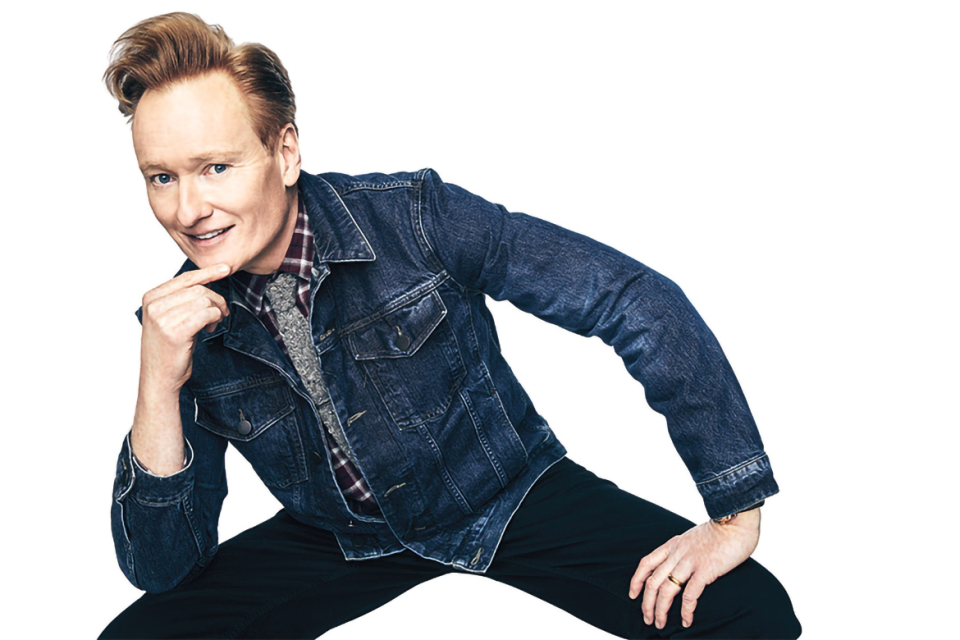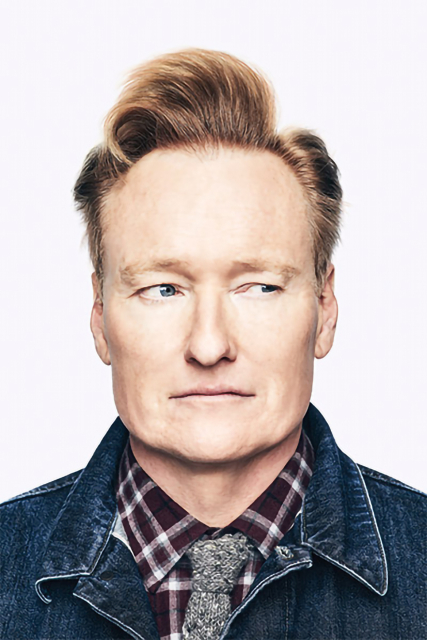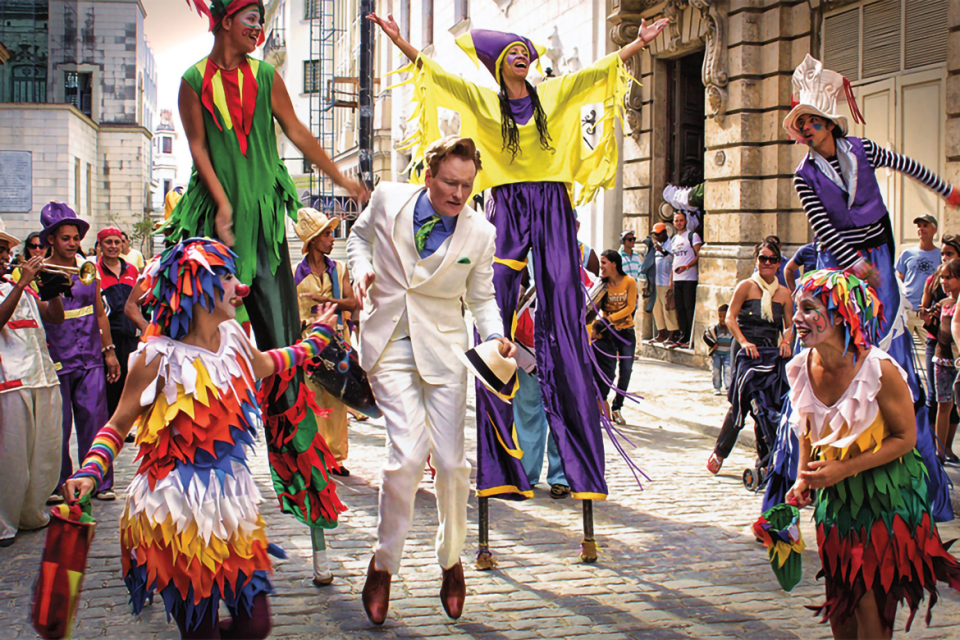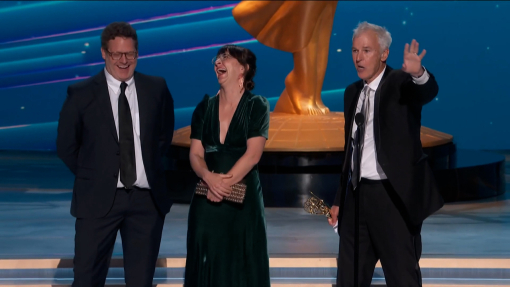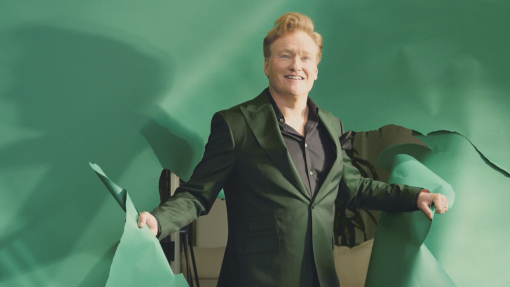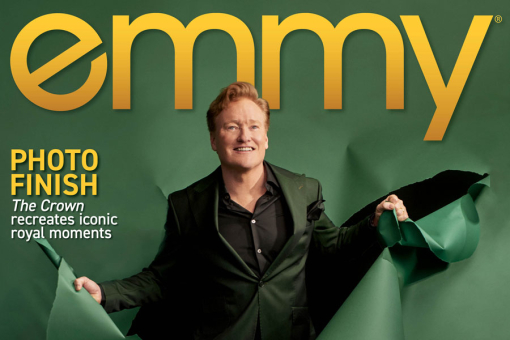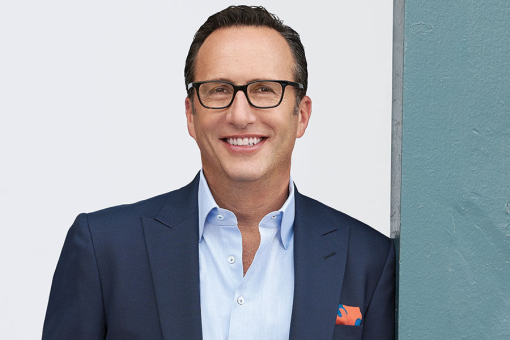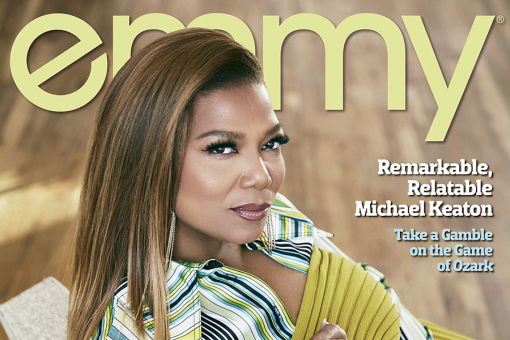Conan O'Brien has accomplished a lot in his television career, but his most shocking achievement may be this: he's 56 years old, but teenagers think he's cool.
"It's weird," the veteran late-night host admits, sinking back in his chair in an office that feels like someone's den — tattered world maps on the wall, a couple of baseball bats on the floor, a few guitars scattered around and a half-empty bottle of Jameson perched on a shelf.
"I still have 13-year-olds coming up to me saying they love my show, even after 26 years of doing this. Maybe they like me because I'm such a child, too. But it still stuns me that I get that reaction, considering I'm just a couple of years away from having been at this for as long as Johnny Carson."
He was an unlikely bet to become the elder statesman of late-night talk shows back in 1993, when NBC plucked him from relative obscurity to replace David Letterman as host of Late Night. At the time, as O'Brien recalls with a smile that hovers between wry and rueful, "I clearly remember hearing, 'You'll be around for a month,' and figuring I'd be lucky to go six months."
He spent the next decade and a half as a favorite with the college-age crowd, thanks in part to recurring bits like the Masturbating Bear and Triumph the Insult Comic Dog. Then, NBC surprised everyone again by tapping O'Brien as Jay Leno's replacement on The Tonight Show as a way to attract a younger demographic to the aging franchise.
He took over in 2009, but in 2010 the network brought Leno back and sent O'Brien packing. In 2011, TBS hired O'Brien to build its own hip, youthful brand by launching a new version of his talk show. However, by fall 2018, O'Brien felt his show had drifted into the traditional, desk-bound relic he'd once satirized.
So he reinvented his career again. He returned to TBS in January, but with a half-hour format that ditches the desk and the band. Meanwhile, he's also launched a podcast, Conan O'Brien Needs a Friend, and a Netflix travel series, Conan Without Borders. He's also rolled out a digital archive of his favorite segments from shows going all the way back to his NBC days.
He may not be young anymore, but O'Brien figures that doesn't matter much as long as he's thinking young. "I said to my wife a week ago, 'This is probably the best time of my career.' It sounds like a quote from someone right before they're off to Borneo and get killed in a zeppelin crash. But the truth is, I'm creatively happier than I've ever been.
"On the TBS show, I can turn things upside-down and it's okay. With the Netflix series, I can go to parts of the world I've always wanted to visit. I can have real conversations on my podcast. I'm grateful for the career I've had up to this moment, but excited about what's still coming."
Longtime emmy contributor Craig Tomashoff spoke with O'Brien about his new ventures and old insecurities — and getting to a place in life he wasn't sure he'd ever reach.
What is the biggest difference between 1993 Conan O'Brien and 2019 Conan O'Brien?
I think the essentials from 26 years ago are still there. All the insecurities are still there. The biggest thing that's changed is the Conan of 26 years ago so desperately wanted to make everybody happy. I got the big job and wanted everyone to be happy. Which was the exact wrong way to approach it. I could feel it in my head every night.
Now, the biggest change, which was accelerated by all the craziness in 2010, is I have this acceptance of myself that's earned through time and pain. All I can do is the work I love to do, and try to make people laugh the way I specifically do that. If someone wants something else, I can't help you. I don't mean that in a mean, "screw you" way. It's more an "I'm sorry, I can't help you" way.
After getting The Tonight Show and then having it taken away, were you tempted to give up on television?
People have this idea that when you get knocked down, you just get right back up and get going. However, there was definitely a period when I was not sure if all this was going to work out. I had to wonder, "What is my career now?" Still, I knew deep down I'm a strong person.
There's this very small Conan inside me who is a tough son of a bitch. I can't always access him, but he's really tough. That small Conan knew everything would be all right, even though I didn't know.
The 2019 Conan seems way busier. You have a talk show, a Netflix series, a podcast and this digital release of your past material. Is that by design?
I've heard musicians talk about how you have to keep learning and challenging yourself. The same is true with what I do. The biggest danger in the job of late-night host is that you rot. Familiarity breeds contempt. When you've been doing the same thing over and over, you start to resent it a little bit. Which is crazy, because it's the best job in the world.
If you're a taster at Ben & Jerry's, 25 years in, you're going to be bitching about having to go in and taste ice cream for a living. So, the travel shows were sort of this catalyst to do something more.
How did they come about?
We had an experience around 2006, when fans in Finland noticed I looked a lot like their president. Who was a woman. We started having fun with that on the show, and it became this whole thing where we started influencing their election. We shot an episode in Finland and I loved it.
I always loved doing remotes. However, there was no opportunity to do something like that again, because of the daily grind of doing Late Night and then The Tonight Show.
After I'd been at TBS a few years, President Obama announced he was trying to renew relations with Cuba. Our head writer, Mike Sweeney, said we should go there and in that moment, I felt like, "We have to go and have to go immediately." Now I'm doing it in other countries. I'm a fish out of water, but I seem to be making a connection with these people.
You've taken six of those TBS specials so far and packaged them into Conan Without Borders on Netflix. Do you still like traveling or has it become a bit of a grind?
I've always loved it! My dad is a research scientist and doctor, and he was doing research on antibiotic resistance when I was a kid. He'd take these long trips that were not pleasure trips. There were six kids in our family, and we all got a turn going with him.
When I was maybe 14 or 15, he did a swing through all of South America and took me. We were in a different city each day, with him going to hospitals and having meetings. It wasn't a fun-in-the-sun vacation, but I caught the [travel] bug.
My daughter once said to me her favorite thing is when we go to the airport early and it's dark out, and we're gone before the sun is up. I thought, "Oh my God! That's how I felt as a kid, too!"
In newsworthy places like South Korea, Haiti and Mexico, you seem to be a better goodwill ambassador for America than some of our actual ambassadors. Do you see this as something more than comedy?
There is a sort of a diplomacy going on. America, especially now, can come across as arrogant and entitled, and I like to present the exact opposite of that. I enjoy going to these countries, where they get to laugh at me.
In Haiti, there was this really tense moment that we kept in the show. We went there just after President Trump called Haiti and African countries "shitholes," and there was a group of Haitian men who were very angry because they saw an American with a camera crew. The translator told us they thought I was just there to show the bad stuff in Haiti.
We went over to them and through the interpreter explained what I do, and then we took out an iPad to show them a monologue I'd done making fun of myself and Trump. They started laughing, and the whole dynamic changed.
I like to put my awkwardness and insecurity out there instead of hiding it. That approach seems to work very well in these countries where Americans might not be seen as humble. Those people get it. You realize there are certain kinds of humor that are really universal.
When your TBS show returned this year, you not only cut it to 30 minutes, you ditched the suits and the desk. What's the best thing about all these changes?
There's not a lot of time, so it focuses you. There are a lot of mannerisms and tropes in late-night comedy that are vestigial, left over from 60 years ago, when things were literally there to kill time. Shows could be two hours long, and the host was reading sides of matchbooks, doing card tricks and tinkling on the piano.
I got to the point, after 25 years of doing an hour, of feeling like, if anything, people really only see this little part or that little part. So why not narrow the focus and be honest about how people are watching us?
I wanted to lose the desk. I only had it because everyone always had a desk. When I first got my job, it was like being hired at Citibank: you wear a tie and a jacket and sit at a desk. I got to the point where if there's something and I don't know why it's there, take it away.
Was doing a podcast part of the makeover?
Not at first. Somebody on my staff said, "You should be doing a podcast," and I said, "Why? I have a TV show and talk to people there." That person was really tenacious, though, so I finally said okay. I taped a practice run with two of the writers and came out high as a kite, because it's so different — you just talk. It lets a different part of my brain run wild.
In what way?
There's no audience and no camera, so when I'm talking to a comedian or an actor, we're not going to do any mugging. I've talked to several physical comedians who use their bodies to get laughs, so a podcast is a way to have this completely different conversation.
I had Stephen Colbert on, and we had a conversation that was very therapeutic for both of us, talking about our anxieties and how hard we are on ourselves. It's a conversation we never could have had on TV. I have a daughter who is tough on herself and has inherited my familial anxiety. She told me how much she enjoyed listening to it.
After years of having to ask celebrities about their latest project, is it a relief to be able to go a bit deeper?
A lot of people think celebrities have better lives than they do, but what I've learned is that no, they don't. People like the myth that nobody has paid a price for what they have.
One of the most fascinating experiences in my life has been driving around Los Angeles and seeing these massive posters of people I know, some pretty well. And in those posters, they're smiling like an emoji. But I see the disparity between that billboard or poster or blimp, and the complex person he or she really is — someone who has problems and insecurities.
What are your promotional pictures like?
I try to have a look of slight uncertainty in them. There are a lot of pictures where I exaggerate it to say, "We both know this is really not possible." There are others where I try to look worried or slightly confused. I don't want everything to seem like life's a gumdrop rainbow treat. I'll have to show you my headshot. The look is kind of like me going, "Huh?" I chose that one because it was ambiguous.
Is there a thread that stitches all your work together?
I'd like to think that throughline is my style of comedy, which is silliness with a drop of humility. Silliness plus humility — that's really who I am. It's like what [Saturday Night Live creator] Lorne Michaels once said to me: "When you're on television every night, eventually what's in you comes out." He was very right. Over time, people get a sense of who you are.
I'm not a perfect person. I have a lot of flaws. Still, I try to be a good person and have a good work ethic. So many people come up and quote back to me the last thing I said on The Tonight Show: "Work hard, be kind and amazing things will happen." I think that resonated with people because they understood that I meant it.
I'm really grateful for the career I've had. If it all stopped today, I'd do a graceful dismount and say, "Man, that was fun! Thank you, universe, and now it's time to get a job at Costco."
This article originally appeared in emmy magazine, Issue No. 6, 2019

